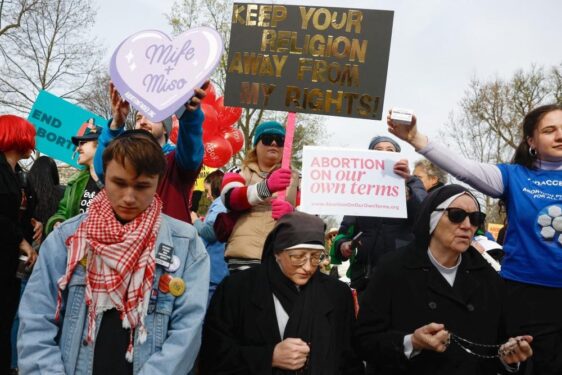
WASHINGTON — During oral arguments March 26 about the public’s access to the abortion pill mifepristone, the Supreme Court justices seemed likely to reject a challenge to the drug’s availability.
The justices heard an appeal by the Biden administration over lower court rulings that had restricted public access to the abortion pill, even by mail.
A lawsuit against the medication was filed last November by the group Alliance for Hippocratic Medicine on behalf of itself and member groups such as the Catholic Medical Association, the Christian Medical and Dental Associations, and other pro-life groups, represented by the religious liberty law firm, Alliance Defending Freedom.
The plaintiffs argued that the Food and Drug Administration failed to adequately evaluate the safety risks of mifepristone when it loosened the rules on who can prescribe the drug and how it can be dispensed in 2016 and 2020. They also said the FDA’s changes created a “substantial risk” because doctors would be forced to treat women suffering emergency complications from the drug, which would violate their personal ethics.
But a large part of the hour and a half of oral arguments focused more on if the doctors who initially issued the lawsuit against the drug’s availability had the legal standing to do so rather than if the FDA’s actions to lift restrictions on the drug were unlawful.
This was the first abortion case before the court since the Dobbs decision overturned Roe v. Wade two years ago.
Solicitor General Elizabeth Prelogar stressed in her closing argument that there was a “profound mismatch” between the injury claimed by the doctor-plaintiffs in this case and the far-reaching remedy they obtained from the 5th Circuit Court that would restrict access to mifepristone across the country.
During the arguments, a few justices said they were curious about potential evidence that doctors had been forced to violate their consciences by treating a patient suffering from a side effect of mifepristone. They also questioned the necessity of the broad sweep of the lower courts’ rulings restricting use of the drug across the country.
Justice Neil Gorsuch described the case as “a prime example of turning what could be a small lawsuit into a nationwide legislative assembly on an FDA rule or any other federal government action.”
Gorsuch, along with Justices Amy Coney Barrett and Brett Kavanaugh asked if the doctors’ objections to medical abortions might be better solved by stressing their conscience objection to certain treatments.
Erin Hawley, the attorney for the anti-abortion doctors and wife of Missouri Republican Sen. Josh Hawley, said this is not good enough because in an emergency situation these doctors may not have time to raise a conscience objection.
Justices Clarence Thomas and Samuel Alito were the only two justices who seemed to side with the doctors in this case, both referring to the Comstock Act, a 19th-century law that prohibited the mailing of drugs used for unlawful abortions.
Alito also questioned if the FDA considered itself “infallible.”
Leaders of the U.S. Conference of Catholic Bishops have been vocal in their opposition to the abortion drug since it was first given FDA approval. They echoed objections in 2016 when the FDA relaxed rules for its use, saying it could be administered with fewer visits to a doctor, and they also objected earlier this year when the FDA announced it was allowing some retail pharmacies to distribute the drug.
Bishop Michael Burbidge of Arlington, Virginia, chairman of the U.S. Conference of Catholic Bishops’ Committee on Pro-Life Activities, issued a statement March 26 that said: “With dangerous abortion drugs now making up the majority of abortions and increasing in use, we pray that the Supreme Court will restore the Food and Drug Administration’s safeguards for the health of women and protect more preborn children.”
